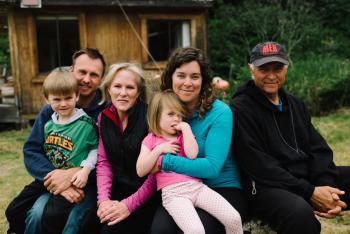Christy Fox-Allen

West Side Stories
These oral histories chart the personal stories of individuals with a longtime connection to the west side of Kodiak Island, defined for the scope of this project as the area buffeted by the Shelikof Strait that stretches from Kupreanof Strait south to the village of Karluk. The project endeavored to create historical primary source material for a region that lacks substantive documentation and engage west side individuals in the creation of that material.
Christy Fox-Allen was interviewed by Anjuli Grantham on July 8, 2015, at Gull Light, Uganik Bay, Alaska, as part of the West Side Stories project by the Kodiak Historical Society. Christy was born July 7, 1952, in Seattle, Washington, where she went to high school and college, but spent every summer living in Uganik Bay. She recounts her family's connection to the fishing industry, detailing her father's early life on a farm in Eastern Washington, fishing in Uganik, and bookkeeping for the local cannery (then known as the San Juan Fishing and Packing Company), before becoming its superintendent. She recalls the history of the cannery and its operations, and memories of life around the Bay and of the people who lived and worked in the area. She also discusses her experiences working in the cannery, from packing eggs to cooking in the mess house, before turning to gillnetting with her husband. She describes changes to industrial relations in the fishing and canning industry, the dynamics of competition among canneries, technological and regulatory changes in the industry, and the growth of gillnetting. She also discusses the different ethnic groups who came to work at the cannery and how the predominantly male population on the Bay began to change when women began working there in the 1960s and later with the growth of family-run fishing businesses. She emphasizes the camaraderie among families and workers, the importance of community, and the lasting friendships formed in the cannery environment. She also touches on significant events like the Exxon Valdez oil spill, the union and strikes, how the closure of the cannery affected life in the area, and changes to community life.
Please Note: The oral histories in this collection are protected by copyright and have been created for educational, research and personal use as described by the Fair Use Doctrine in the U.S. Copyright law. Please reach out Voices@noaa.gov to let us know how these interviews are being used in your research, project, exhibit, etc. The Voices staff can help provide other useful resources related to your inquiry.
The NOAA mission is to understand and predict changes in climate, weather, oceans, and coasts, to share that knowledge and information with others, and to conserve and manage coastal and marine ecosystems and resources. The Voices Oral History Archives offers public access to a wide range of accounts, including historical materials that are products of their particular times, and may contain offensive language or negative stereotypes.
Voices Oral History Archives does not verify the accuracy of materials submitted to us. The opinions expressed in the interviews are those of the interviewee only. The interviews here have been made available to the public only after the interviewer has confirmed that they have obtained consent.
